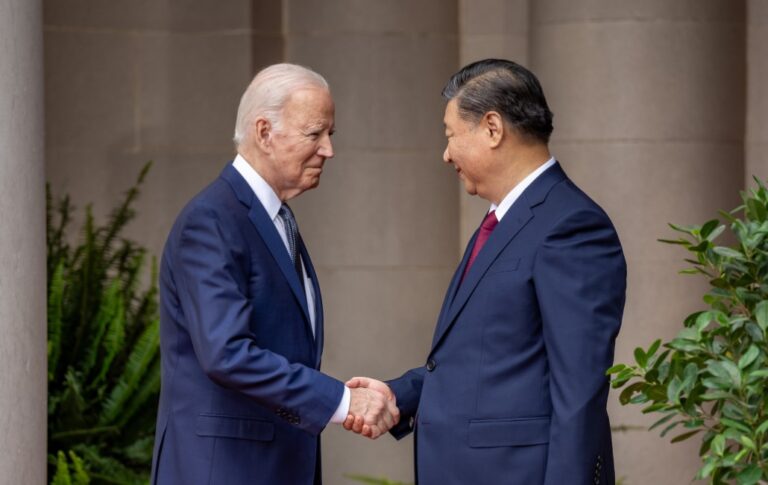Restoring “high-level” military communications, cooperating in the fight against drugs, and “coexisting peacefully and with respect for each other.” The year long awaited meeting between U.S. President Joe Biden and his Chinese counterpart Xi Jinping put the seal on the thaw between the two super powers.
After months of tension that began with the case of the spy balloon that had flown over U.S. skies earlier this year before being shot down, the two countries are back to talking directly to each other and trying to strike a balance.
Table of Contents
Biden and Xi bilateral meeting in San Francisco
Xi told Biden that it is “unrealistic” for either of the two military and economic superpowers to think about “reshaping the other.” “The world is big enough,” was the message that emerged during the bilateral, “for both countries to succeed.
The meeting that had been awaited for months took place at an old estate a half-hour drive south of San Francisco, California, between the two leaders and their respective advisory staffs.
The talks lasted nearly four hours and were marked, when it was not yet concluded, by phrases delivered to the media so that the message wanted by both would come through loud and clear.
Between the United States and China, dialogue has resumed, “things are going well.” A message to the world divided by war in every region, but making headlines especially for the conflict between Ukraine and Russia, and in the Middle East between Hamas and Israel.
Taiwan, hope for peaceful resolution
The two leaders offered reassurances on cooperation, but it was on Taiwan that the clearest messages came. Xi assured that no military action by China is planned, making it clear that the hope is for “peaceful reunification.”
Biden called for Beijing not to interfere in the elections that await Taiwan, Xi relaunched by asking the U.S. leader to stop supplying weapons to the island.
There will be strong cooperation in the battle over the trafficking of fentanyl, the psychotropic drug that is claiming thousands of lives in the two countries and has become a social emergency in the United States.
China is also a party involved because it is the main producer of one of the synthetics that make up the drug, the new “chemical gold” on which the Mexican drug trade is building an empire.
The two leaders have pledged to form a team to work together to counter opioid trafficking. While on artificial intelligence, the same result was not achieved. Both said that “a lot of work is still needed” to find a common path, but new meetings, starting with a forum, between engineers from both countries will be set in the coming months.
Biden, competition is not confrontational
Biden, as host, recalled his relationship with Xi going back years. But avoided presenting him as an “old friend.” What matters, he reiterated, is “ensuring that competition does not generate conflict.” And when asked if he still considers Xi a dictator, Biden replied that “yes, he is as the leader of a communist country.”
Whether thawing will really be will be seen in the coming weeks. But in the meantime a small signal had come from the UN Security Council, where the U.S. and China did not block the latest resolution, introduced by Malta, calling for a humanitarian pause in Gaza to give access to aid to the population affected by Israeli bombing.
With the previous four resolutions, the two Giants of the Earth had been in opposite positions. Not this time. And in San Francisco the climate of harmony was shown to the whole world. In the evening Biden and first lady Jill Biden welcomed all guests at an official reception that this time took on more than symbolic value.
Washington-Beijing, a hotline in case of crisis
“We have resumed dialogue with China after a period of coolness in relations,” Biden said, announcing the resumption of a hotline with Xi that will be used in the event of a crisis. However, despite the apparent thaw, many issues between the two great powers remained unresolved.
Starting with the Taiwan issue. Beijing’s leader, according to China’s Foreign Ministry, told Biden that the U.S. should “take concrete actions to honor its commitment not to support Taiwan’s independence and stop arming it, supporting the peaceful reunification of China,” a process now “unstoppable,” according to Xi.
Biden, on Middle East ‘moderately optimistic’
The White House chief responded to reporters on the war in the Middle East, said he was “moderately optimistic” about the negotiation for the release of hostages in Hamas’s hands.
And he defended the Israeli attack on a hospital in Gaza, arguing that “Hamas is hiding its headquarters, weapons, equipment in this hospital and, I suspect, in others.”
In the long run, he added, “the only answer is a two-state solution,” but in the meantime he stressed repeatedly that Hamas has threatened to repeat the Oct. 7 terror attack. “The war will end when Hamas is defeated,” Biden concluded, reiterating a warning to Israel, however: “Israel’s occupation of Gaza would be a grave mistake.”
Read also: US, China, Russia and the rest: how the major powers are taking sides in the Hamas-Israel war












